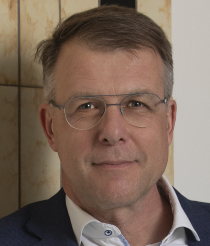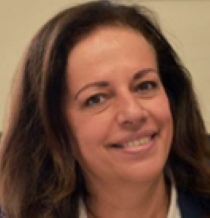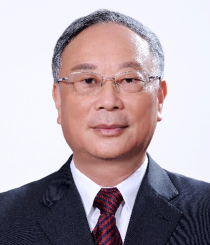Programme
The MARTECH 2024 programme is now available.
Keynote Lectures (Initial List)
• Atilla Incecik, "Recent Trends in Ocean Engineering"
• Bas Buchner, "Challenges for Future Maritime Technology and Engineering"
• Maria Boile, "Roadmap for the European Research in Waterborne Transportation"
• Xinping Yan, "Progress of Autonomous Ships in China"
 Atilla Incecik is Professor of Offshore Engineering at the University of Strathclyde, Glasgow. During the last sixteen years he served as the Head of Department of Naval Architecture, Ocean and Marine Engineering, and Associate Principal and the Executive Dean of the Faculty of Engineering. Professor Incecik’s research activities include the development of hydrodynamic design and analysis tools and model testing of marine and offshore engineering systems, including marine renewable energy devices.
Atilla Incecik is Professor of Offshore Engineering at the University of Strathclyde, Glasgow. During the last sixteen years he served as the Head of Department of Naval Architecture, Ocean and Marine Engineering, and Associate Principal and the Executive Dean of the Faculty of Engineering. Professor Incecik’s research activities include the development of hydrodynamic design and analysis tools and model testing of marine and offshore engineering systems, including marine renewable energy devices.
Professor Incecik was the Research Manager of Industrial Doctoral Centre for Offshore Renewable Energy (IDCORE) and is a Chair Professor at Zhejiang University. Professor Incecik was Editor-in-Chief of Ocean Engineering Journal between 2006 and 2023. In 2019 Professor Incecik was awarded an Honorary Doctorate by Chalmers University of Technology, Sweden in recognition of his research on green shipping and environmental sustainability.
|
Keynote Lecture: Harnessing Energy from the Oceans
The demand for energy will increase as the world population and the prosperity in the world increase. By 2050, it is expected that the global population will increase by about 20% to 9.6 billion. This presentation will focus on how the world’s energy demand can be met by offshore oil and gas and renewable sources in the ‘energy transition’ era.
Today about 28% of oil and 38% of gas are produced from the offshore locations. However, only 14 percent of all energy production comes from renewable sources. Renewable energy is estimated to make up 77% of the world's primary energy supply by 2050. Today 16% of electricity output produced from offshore wind. For the near future (2030), it is expected that global installed capacity of offshore wind will reach 130–140 GW, compared to less than 20 GW installed at the end of 2018. By 2050, the capacity in Europe is expected to reach 400 GW and globally well above 500 GW.
The presentation will start by describing the primary energy consumption by fuel types as function of three different scenarios: “Accelerated” and “Net Zero” when the world collectively takes actions for CO2-equivalent emissions to fall by around 75% by 2050 (relative to 2019 levels) in “Accelerated” and 95% in “Net Zero”. In the ‘New Momentum’ scenario CO2 emissions peak in the 2020s and are around 30% below 2019 levels by 2050.
The presentation will continue by illustrating the locations of the global deep-water oil and gas reserves and different types of oil and gas exploration and production platform. The design principles in selecting different types of oil and gas production platform and analysis methods will be discussed.
The presentation will be concluded by describing the offshore renewable energy devices, life cycle assessment of these devices, and some recent floating offshore wind turbine installations in Scotland.
|
 Dr. Bas Buchner studied at Delft University of Technology and graduated in 1991. He joined MARIN and was responsible for many offshore model test and simulation projects related to mooring, platform response, offloading analysis and wave impact loading. He specialised in the topics of extreme waves, green water loading and wave impacts. He completed his PhD on the subject of ‘Green Water Loading on Ship Type Offshore Structures’ (2002). He was Manager of the MARIN Offshore Department from 2000 to 2010 and was the leader of many Joint Industry Projects (JIP’s) in the Offshore sector. In 2007 he started the MARIN Renewable Energy Team (RENT) to contribute to the development of offshore renewable energy with MARIN’s expertise. He has authored more than 50 papers in the field of offshore and ship hydrodynamics. Since 2011, he is President of MARIN. Under his leadership MARIN developed it’s new ‘Better Ships, Blue Oceans’ strategy, focusing MARIN’s mission on cleaner, smarter and safer shipping and sustainable use of the seas.
Dr. Bas Buchner studied at Delft University of Technology and graduated in 1991. He joined MARIN and was responsible for many offshore model test and simulation projects related to mooring, platform response, offloading analysis and wave impact loading. He specialised in the topics of extreme waves, green water loading and wave impacts. He completed his PhD on the subject of ‘Green Water Loading on Ship Type Offshore Structures’ (2002). He was Manager of the MARIN Offshore Department from 2000 to 2010 and was the leader of many Joint Industry Projects (JIP’s) in the Offshore sector. In 2007 he started the MARIN Renewable Energy Team (RENT) to contribute to the development of offshore renewable energy with MARIN’s expertise. He has authored more than 50 papers in the field of offshore and ship hydrodynamics. Since 2011, he is President of MARIN. Under his leadership MARIN developed it’s new ‘Better Ships, Blue Oceans’ strategy, focusing MARIN’s mission on cleaner, smarter and safer shipping and sustainable use of the seas.
|
Keynote Lecture: Challenges for Future Maritime Technology and Engineering
In a time of large transitions and societal challenges, the role of Maritime Technology and Engineering is changing. The energy and digital transition on one hand, combined with the challenges of safe, secure and free seas on the other, require us to rethink this role. This analysis shows that traditional fields of knowledge, such as hydrodynamics, structures and marine power systems, cannot provide us the required solutions at their own. An integrated approach is needed, coupling these technologies and combining the traditional model (or physics) based approach with data driven methods and Artificial Intelligence. It is also important to combine these methods with disruptive innovation to bring the maritime sector forward. Based on MARIN’s ‘Better Ships, Blue Oceans’ strategy, Dr. Bas Buchner presents how research institutes and companies can potentially deal with these challenges.
|
 Prof. Maria Boile is Director of the MSc in Shipping and Director of the Quantitative Analysis in Shipping Laboratory at the University of Piraeus, Department of Maritime Studies. She is Head of the Transport Economics and Environment, Maritime and Air Transport Sector, at the Hellenic Institute of Transport (HIT), Centre for Research and Technology Hellas (CERTH). She is Affiliated Faculty with the Center for Advanced Infrastructure and Transportation, at Rutgers, the State University of New Jersey, and Coordinator of the European Waterborne Technology Platform.
Prof. Maria Boile is Director of the MSc in Shipping and Director of the Quantitative Analysis in Shipping Laboratory at the University of Piraeus, Department of Maritime Studies. She is Head of the Transport Economics and Environment, Maritime and Air Transport Sector, at the Hellenic Institute of Transport (HIT), Centre for Research and Technology Hellas (CERTH). She is Affiliated Faculty with the Center for Advanced Infrastructure and Transportation, at Rutgers, the State University of New Jersey, and Coordinator of the European Waterborne Technology Platform.
Professor Boile has served in senior academic and research positions in Europe and the U.S. She holds a diploma in Civil (Transportation) Engineering from the National Technical University of Athens, Greece, M.Sc. in Civil and Environmental Engineering from Rutgers University, US, and Ph.D. in Transportation Engineering from the New Jersey Institute of Technology, US. She has participated in over 80 sponsored research projects, as a principal investigator in over half of them. She has authored and co-authored over 170 technical articles, 12 book chapters and two books.
|
Keynote Lecture: Roadmap for the European Research in Waterborne Transportation
Energy transition in the waterborne transport sector will translate into compliance costs and will have an impact on the market. The extent of this impact and the level of the compliance cost will depend on many factors, including the pace of the technological development, the availability and the cost of alternative fuels, market adoption, and, of course, on the level of regulation and its effectiveness. Additional work is needed to ensure that transition to a low carbon (or zero carbon) waterborne transport industry is done in a fair and equitable manner. Research, development and innovation play a major role in this transition. The Research and Innovation Agenda of the waterborne transport sector, as this has been developed within the context of the Waterborne Technology Platform activities and especially the Zero Emission Waterborne Transport Partnership, will be discussed.
|
 Dr. Xinping Yan is Chair Professor and Director of State Key Laboratory of Maritime Technology and Safety, Base for International Science & Technology Cooperation on Smart Shipping and Maritime Safety (MoST), Wuhan University of Technology, China. He is the Chair of Intelligent Water Transport Safety of IEEE ITS and a Fellow and Chartered Marine Scientist of IMarEST.
Dr. Xinping Yan is Chair Professor and Director of State Key Laboratory of Maritime Technology and Safety, Base for International Science & Technology Cooperation on Smart Shipping and Maritime Safety (MoST), Wuhan University of Technology, China. He is the Chair of Intelligent Water Transport Safety of IEEE ITS and a Fellow and Chartered Marine Scientist of IMarEST.
In 2019, he was elected Academician of the Chinese Academy of Engineering (CAE). His research interests include intelligent transport system key technologies, intelligent fault diagnosis of marine engines, renewable energy, energy efficiency management of the vessel, navigation systems for vessels, amongst others.
|
Keynote Lecture: Progress of Autonomous Ships in China
Intelligent ship navigation technology is expected to significantly improve the safety and green of shipping systems, gradually reduce or replace crews, fundamentally promote the transformation of transportation system, and become one of the hot issues of concern in the shipping industry. This paper first analyzes the research progress of key intelligent navigation technologies such as intelligent perception, intelligent decision-making, intelligent control, and communication and network security. Then, it comprehensively introduces typical application cases carried out in China in assisted navigation, remote navigation, autonomous navigation, and formation navigation. Finally, the key development directions of ship-shore collaboration technology and ship-port intelligent equipment and systems under the new generation of transportation system architecture were discussed. This article can provide theoretical support for the research of intelligent navigation technology.
|
|
|